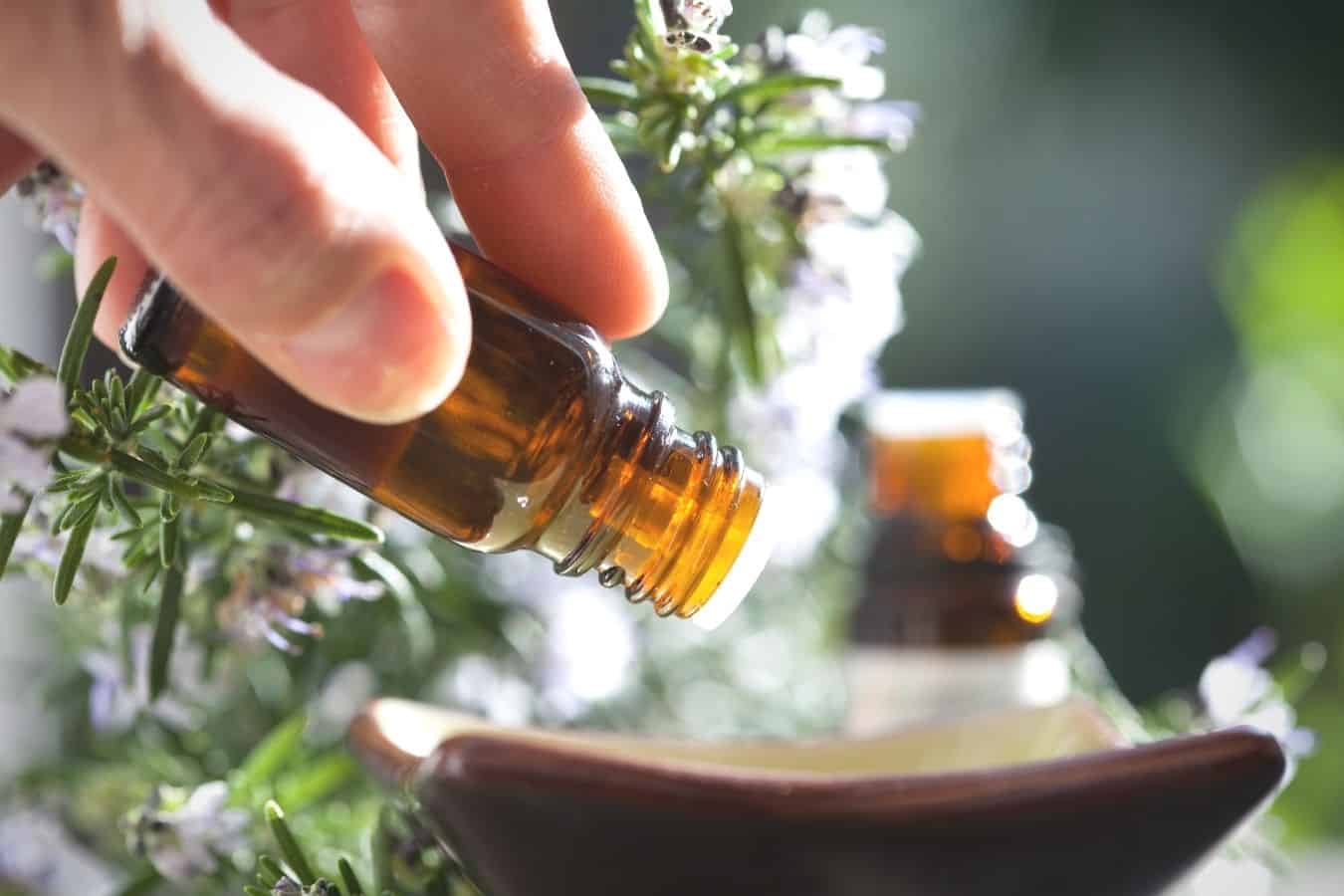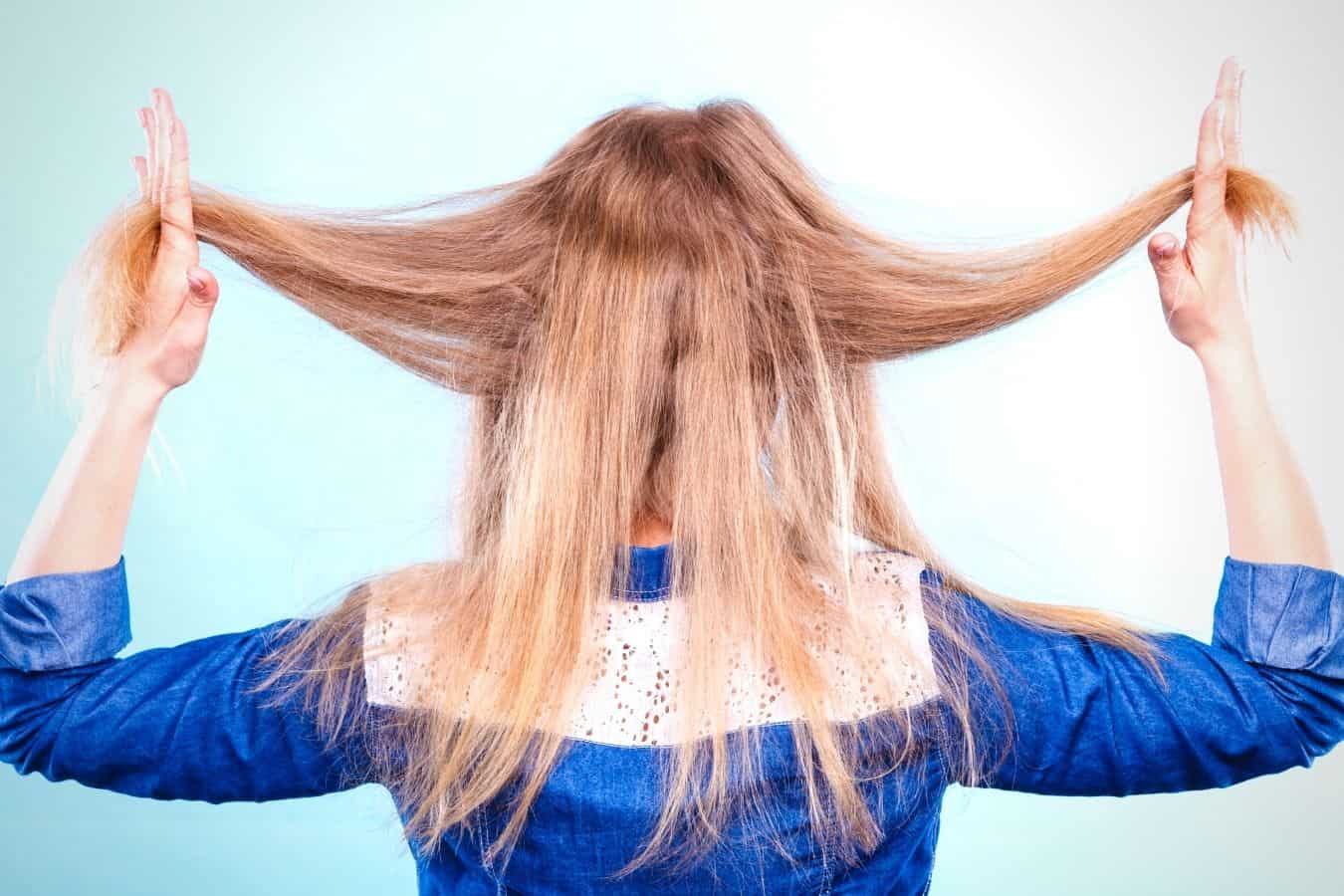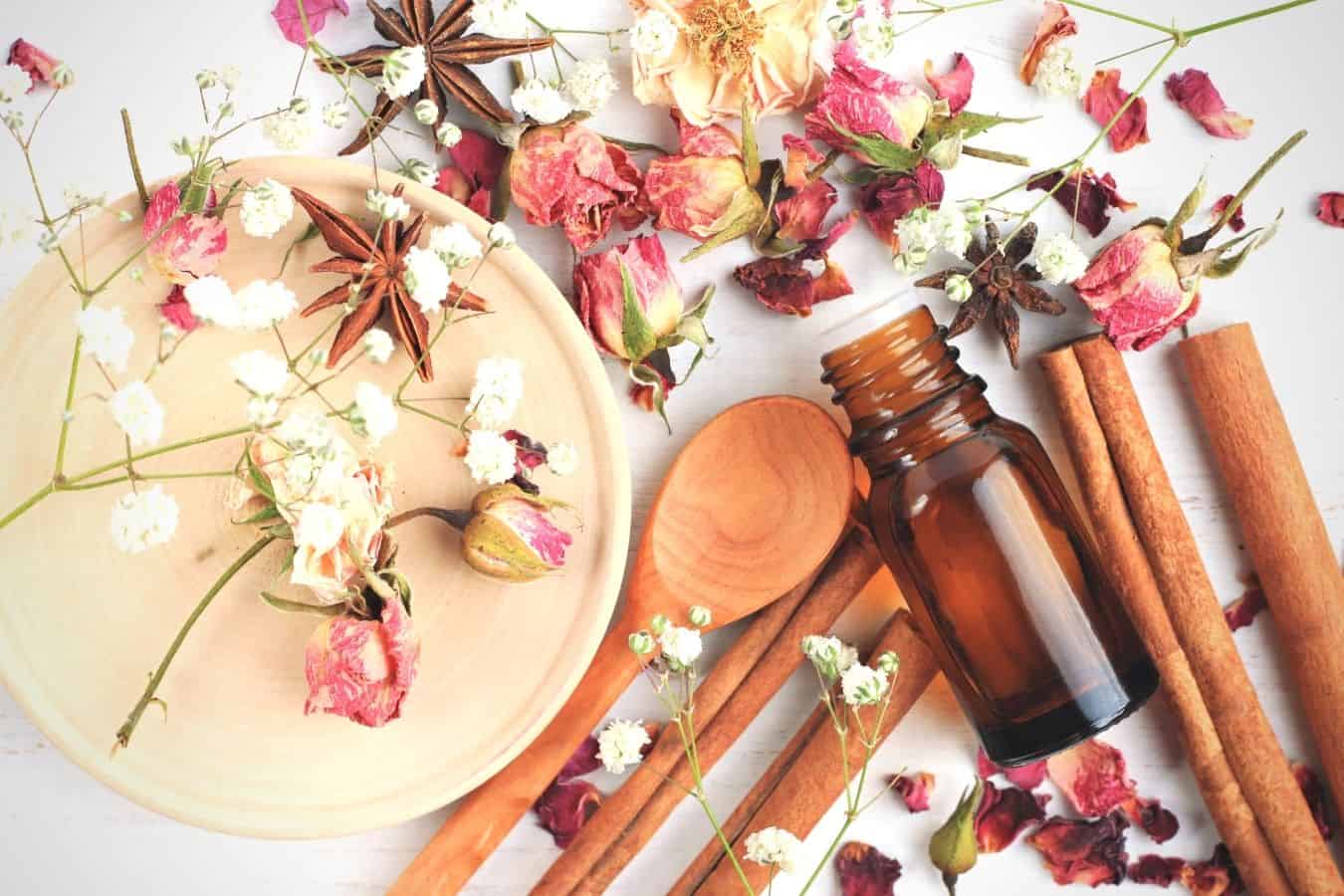Essential oils can play a huge role in the health of your hair and scalp. In this article, we will explain how to use essential oils for frizzy hair.

This post contains affiliate links and we may earn if you click on them (at no extra cost to you). Please read our full disclosure policy here.
In A Hurry? Our Favorite Essential Oils For Frizzy Hair
| Description | Price | ||
|---|---|---|---|
Top | MAYJAM Lavender Essential Oils 100ml | Buy on Amazon | |
 | Tisserand Aromatherapy - Peppermint Essential Oil, 9 ml | Buy on Amazon | |
 | Gya Labs Ylang Ylang Essential Oil for Aromatherapy - 10ml | Buy on Amazon | |
 | Tisserand Aromatherapy - Geranium Essential Oil, 9ml | Buy on Amazon | |
 | Gya Labs Organic Rosemary Essential Oil -10ml | Buy on Amazon |
What Causes Frizzy Hair?
Frizz is a result of the cuticle layer of the hair being raised, causing moisture to escape and leaving the strands dehydrated. Frizzy hair will often feel rough to the touch and it can be harder to style and maintain.
There are many causes of frizzy hair but these are the main reasons:
- Living in humid areas
- Using harsh or drying hair products
- Genetics (some people have curlier hair and are naturally prone to frizz)
- Excessive heat styling
- Over-washing your hair
- Brushing hair when it’s wet (wet hair is very fragile and can lead to frizz or breakage)
What Are Essential Oils
Essential oils derive from plants and act as a concentrated version or the ‘essence’ of the plant’s flavor and scent. The oil is extracted through distillation and methods such as cold pressing.
Essential oils are widely used for aromatherapy to help to stimulate parts of the body to help with conditions such as stress, anxiety, and insomnia.
It is also claimed that essential oils help reduce inflammation and support the body’s overall wellbeing.
Beyond aromatherapy, essential oils are also widely used in the beauty industry. Essential oils are often added to hair care products to provide a pleasant natural scent and this also makes them perfect for use in DIY hair masks and scrubs.
Also Read: Can You Use Oil As A Detangler? A Helpful Guide
How Essential Oils Can Help With Frizzy Hair

Adding essential oil to your hair care routine can be incredibly beneficial:
Lavender essential oil provides a deep condition to frizzy hair and protects hair against dandruff
Rosemary essential oil stimulates the roots which improve circulation that can aid in hair growth
Chamomile essential oil adds softness to frizzy hair and contains soothing properties for the scalp
Sandalwood essential oil is beneficial for dry hair
It’s important to note that essential oils must always be diluted with water or carrier oil before applying to prevent skin irritation. Diluting essential oils with a carrier oil is a common practice that proves to enhance the benefits and improve the condition of dry hair.
Here are some of the most effective ways to use essential oils for frizzy hair.
Pre Poo
Pre-pooing is often used in curly hair care whereby you apply oil to your scalp before shampooing. The main benefit of pre-pooing is to lessen the drying effects of shampoo and other hair products.
Many hair products, even the more natural ones, remove too much sebum which can cause an itchy scalp and dry hair.
Applying an oil-based product alongside essential oils helps to further protect the hair from damage and keep the scalp healthy. Healthier hair is less prone to frizz and breakage.
It’s not necessary to pre-poo with essential oils every time before washing your hair but it can improve the condition of your hair if you do it frequently.
Instructions:
- Pick a penetrating oil to mix with your chosen essential oil. A good choice would be coconut oil or extra virgin olive oil, but this depends on your hair type and preference
- Mix 1 – 5 tablespoons of oil (depending on the length and thickness of the hair) with just a few drops of essential oil. You can choose peppermint, tea tree, or lavender. Choose one that suits your hair type and your needs
- Warm the carrier oil and essential oil up in your hands and begin applying it to the roots down to the tips
- Leave the mixture on your hair for 30 – 60 minutes before you wash your hair
- Ensure you rinse out all of the oil and essential oil to prevent greasiness
Hot oil
A hot oil treatment follows the same process as the pre-poo method except for one difference. The oil is typically heated up in the microwave before applying. Hot oil increases the rate of absorption, making it more effective at reducing frizz and improving the texture of hair.
Instructions:
- Heat the oil up for around 10 seconds. Check the temperature before applying as you don’t want to burn the scalp
- Add in a few drops of essential oil
- Start applying it to dry hair, starting from the roots down to the ends
- Massage it into the scalp to start stimulating the hair follicles
- Once the hair is saturated, let it sit for at least 30 minutes before rinsing it out
Also Read: How To Use Pomelo Oil For Hair Growth
Sealing hair For Moisture and Length Retention
Sealing the hair is one of the best methods to reduce frizz and dry hair. It’s beneficial if you have thick, coarse, wavy, or curly hair. With this method, you will need to combine a sealing oil with a few drops of essential oil to create a solution that will sit on top of the hair.
Instructions:
- Make sure hair is moisturized before this treatment as sealing oils help to lock in moisture in dry hair.
- Use a sealing oil like grapeseed or black castor oil and mix it with a few drops of essential oil
- Apply a small amount to sections of the hair. It may be best to avoid the scalp as this can lead to excess grease
- Allow it to dry and style as usual. The essential oils help to further protect the hair from damage
Hair Mask To Combat Dry Hair
Doing a hair mask once a week is a great way to ensure that you keep your hair healthy. Hair masks can benefit the hair by adding shine, increasing softness, and preventing frizz and flyaways.
There are many different DIY hair mask recipes that you can try, but it’s worth experimenting with different ingredients until you find what works best for your hair type.
Instructions:
- Mix 2 tablespoons of oil, 1-2 tablespoons of honey and 1 egg together in a bowl or jug. Add in 4 – 7 drops of essential oil
- Using either your hands or a brush, apply the essential oil mixture over damp hair, starting from the roots to the ends
- Massage it in and ensure that every section is fully saturated
- Leave it in for 1 – 3 hours for best results
- Wash your hair, you may need to repeat this twice
Leave-in Treatment
Essential oils can be diluted with water and used as a spray for your hair. This spray is lightweight on the hair and can be left in all day to keep frizz and flyaways at bay. It also keeps your hair smelling fresh!
How to do it:
- Mix ½ cup of water with 4 – 7 drops of essential oil
- Transfer to a spray bottle and shake well
- Spray all over damp or dry hair or just on the ends if they are prone to frizz
Things To Be Aware Of When Using Oil On Hair
While oils can be very nourishing when used on the hair and scalp, there are a few things to consider before applying them.
Oils Aren’t Suitable For Everyone
Some people who have fine, thin hair may find that most oils weigh the hair down or make it appear greasy.
If this happens, it’s absolutely normal and it could mean that your scalp simply produces enough sebum on its own.
Your scalp could be producing too much sebum, so putting oil directly on the scalp could cause further problems. Not all oils are created equally and not all of them will be suitable for your hair type.
You may need to experience with several different oils before finding one that works for you.
Overnight Treatments Aren’t Always Recommended
While some people may benefit from overnight oil treatments, others may experience some side effects such as an itchy or oily scalp.
The main concern with leaving oil treatments on overnight is that it could lead to Hygral Fatigue, a hair condition that is typically caused by the hair being over-conditioned.
If you are going to apply an oil to the hair overnight, it might be best to avoid the scalp and ensure that it’s left on for no more than 7 – 8 hours.
Also Read: How To Use Grapefruit Essential Oil For Hair Removal
Essential Oil For Frizzy Hair: The Best Oils To Use

There are many essential oils that are great for keeping the hair looking and feeling healthy.
Finding the one that works for your hair type is important. That’s why we’ve compiled a list of some of the best essential oils to combat frizz.
Lavender Essential Oil
Lavender oil is one of the oldest and most popular oils used today. Known for its unique and calming scent, lavender has many different purposes.
It’s often used in aromatherapy and recommended for better sleep, but it can also improve the condition of hair.
The greatest thing about lavender oil is its ability to strengthen the hair follicles and promote growth.
When using lavender regularly in your haircare routine, it can restore damaged hair, improve the texture of the hair strands, and give an added shine and softness.
Best used as: A leave-in treatment to reduce frizz and keep hair smelling fresh all day long
Peppermint Essential Oil
Peppermint is known for having a fresh smell and lots of good flavor, but it’s also great at improving the appearance and texture of hair.
Peppermint has antibacterial properties that can aid in relieving an itchy, irritated scalp, which in turn, can repair the follicles and promote hair growth.
Peppermint is also very moisturizing, which means it can be used to treat dryness and prevent frizz. You can see some improvement by using it on your hair once a week or more.
Best used as: A pre-poo, hot oil, or hair mask treatment. Alternatively, you can add a few drops of the oil to your shampoo or conditioner and rinse out.
Ylang Ylang Essential Oil
Ylang Ylang Oil is extracted from the flowers of Cananga Odorata, a plant that is native to Malaysia, the Phillipines and Indonesia. Ylang Ylang Oil stimulates sebum production, which relieves a dry scalp and leaves the hair conditioned.
With the hair getting the correct balance of moisture, the hair is in better overall condition. This prevents it from drying out, which is often the cause of frizz and split ends.
Best used as: A hair mask or pre-poo treatment to ensure it has enough time to soak into the hair and balance sebum production.
Geranium Essential Oil
Derived from the leaves of Pelargonium graveolens, a plant native to South Africa, Geranium Oil has many different uses.
Geranium is especially good at moisturizing dry skin and providing intense hydration. With anti-inflammatory and anti-bacterial benefits, it’s also suitable for relieving dry, itchy scalps.
Best used as: Sealing the hair or leave-in treatment
Rosemary Essential Oil
Rosemary essential oil is a popular oil that is often recommended in the hair community.
It has antioxidant properties that helps to treat an itchy and irritated scalp and it can often be used to promote hair growth.
An interesting fact about Rosemary Oil is its ability to nourish and repair hair follicles, leaving the hair smoother and shinier.
This makes it a great essential oil to reduce frizz and tangles. When used regularly, it can make hair appear thicker and fuller.
Best used as: A pre-poo for dry hair, hair mask, or hot oil treatment once or twice a week
Sandalwood Essential Oil
Sandalwood essential oil is frequently used in aromatherapy as it boasts many health benefits.
When looking at managing frizzy hair, Sandalwood oil is one of the best choices due to its moisturizing benefits.
With antimicrobial and anti-inflammatory properties, it can be used to treat dandruff while restoring moisture to the hair strands.
Sandalwood is very effective at targeting dryness and giving hair a natural, healthy shine.
Best used as: A pre-poo, leave-in, or to seal the hair.
Disclaimer: This site is not intended to provide professional or medical advice. All of the content on LovedByCurls.com is for informational purposes only. All advice should be followed at your own discretion. Ingredients may change at any time so always check the product label before using. Check our full disclaimer policy here.






